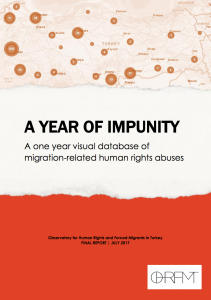OHRFMT* just published a report as a summary of one year visual database of migration-related human rights abuses. Read the whole report here and proceed to read a summary.

The main findings of this report are as follows:
- OHRFMT concludes that reports relating to readmission back to Turkey from the EU were highly inconsistent and under reported, often with large time gaps between them. Furthermore, content of reports failed to indicate the fate of those sent back to Turkey.
- In reports relating to arrests, OHRFMT recorded a total of 322 arrests from 42 different countries. This showed the demographic breadth of Turkey’s migrant population. Most arrests took place in coastal areas or following interception at sea. In the case of the latter, the Observatory is concerned about the legal grounding of arrests at sea and the high possibility of ‘push backs’ of which are in breach of the concept of non-refoulement.
- Whilst processing report data, OHRFMT found that there was consistently a correlation between discrimination and issues relating to problems in accessing goods and services guaranteed by various human rights instruments. It found that in the majority of cases, refugees were not able to access, for instance, educational or health facilities due to their unclear status within Turkey.
- OHRFMT found that in reports relating to abuse / exploitation, those individuals within the vulnerable sector most often became the targets to acts of violence and physical or sexual exploitation. Children were the primary victims, but findings showed that abuse and exploitation was also gendered, with young girls and women taking up the second largest target demographic. Data showed that in 51% of the reports, the identity of the perpetrator was either unknown or unspecified. OHRFMT is concerned that state authorities are not holding perpetrators accountable and/or undertaking adequate investigations on these serious acts.
- In reports relating to loss of life, OHRFMT determined that most deaths occurred in transit areas, either within the Aegean Sea or at Turkey’s eastern border. OHRFMT would like to underline the responsibility that Turkey has towards providing safe passage for all.
As a result of these findings, the following recommendations have been made:
- OHRFMT recommends that a database of returns to Turkey be made publicly available.
- OHRFMT would like to remind Turkey of its responsibility towards to principle of non-refoulement and asks that refugees intercepted in transit zones and currently in detention / processing facilities be made accessible to lawyers.
- OHRFMT recommends that Turkey suspend its geographic limitation to the 1951 Refugee Convention and allow all forced migrants within its national borders to apply for formal refugee status.
- As collected reports have repeatedly shown that children, girls and women make up the majority of victims of discrimination, abuse and exploitation, OHRFMT reminds Turkey that it has a responsibility to protect those within the vulnerable sector.
- OHRFMT recommends that Turkey take affirmative action to provide safe passage to all who wish to transit through its territory and do all it can to preserve the right to life of those transient refugees.
OHRFMT believes that the vast majority of those mentioned in collected reports should have access to a formal asylum process to make a claim for refugee status. As a result, you will find that the Observatory often refers to forced migrants within Turkey as ‘refugees’ albeit these individuals not having formal Convention Refugee status. This is intentional, not a mistake.
*Observatory for Human rights and Forced Migration in Turkey
